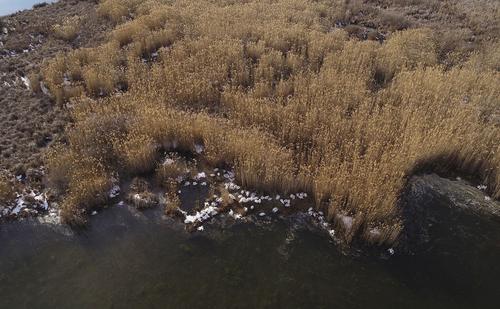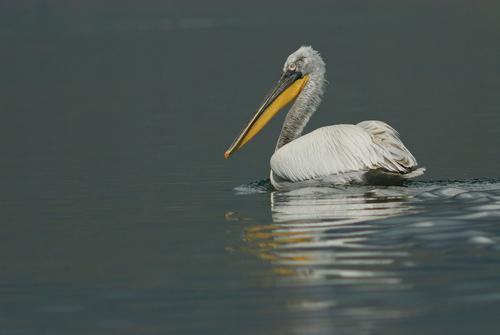The H5N1 avian influenza, or ‘bird flu’, virus has been particularly rampant this winter. The death of thousands of cranes in the Hula Valley in Israel attracted widespread attention. Now, the disease is also threatening the world’s largest colony of very rare Dalmatian pelicans.

This drone image shows many dead or dying Dalmatian pelicans at Great Prespa Lake.
© SPP Archive I O. Alexandrou
Probably the most striking feature of the Dalmatian pelican is its huge bill which has an elastic pouch of skin beneath it.
© Peter SacklA major outbreak of avian influenza has struck the Prespa National Park in north-western Greece. Particularly hard hit have been the Dalmatian pelicans, whose colony at Lake Prespa is the largest in the world. The mass bird deaths began in February, when the first pelicans returned to Lake Prespa from their overwintering grounds in the north east of Greece and western Turkey. Since then, the number of dead birds has risen to 600.
The dead pelicans were reproductively mature birds that should have started breeding around this time. Instead of a flurry of nest-building activity, a number of dead pelicans can now be seen lying on the nesting islands, or close to them in the water. "This is an immensely painful loss," said Dr Stefan Ferger, migratory bird expert at EuroNatur. "The mortality rate among Dalmatian pelicans already stands at 60 percent. Unfortunately, we must expect a poor breeding season at Lake Prespa this year," Dr Ferger added.
In order to contain the spread of bird flu at Lake Prespa, the carcasses need to be collected. This is a logistically difficult task for the Greek authorities. These interventions also disturb the breeding activities of pelicans that are uninfected or immune.
Background information:
- The Dalmatian pelican (Pelecanus crispus) can achieve a length of up to 180 centimetres and a wingspan of almost three metres. This makes it one of the largest flight-capable birds on earth. Its population has declined dramatically since the 19th century, and today, only around 11,400 to 13,400 individuals remain worldwide. In south-eastern Europe, however, measures being taken to protect the Dalmatian pelican are paying off. Populations have been stable there for years.
- The Prespa Lakes, situated in the border region between Greece and Albania, are among the most important wetlands in south-eastern Europe. EuroNatur has been involved there since 1994. Working together with its partners, the Foundation was able to get large parts of the area placed under conservation protection. The Great Prespa Lake is home to the world's largest colony of Dalmatian pelicans.
- Avian influenza (H5N1), also known as bird flu, is an infectious disease caused by influenza viruses. It occurs - especially in wild aquatic birds - almost every winter, but this year its impact has been more dramatic than ever. In Israel's Hula Valley, more than 5,000 cranes and many other birds have died, and in Germany too, bird flu is particularly rampant.
Enquiries: Christian Stielow, E-Mail: christian.stielow(at)euronatur.org, Tel.: +49 (0)7732 - 92 72 15


